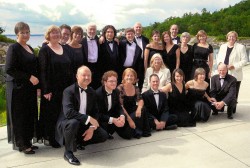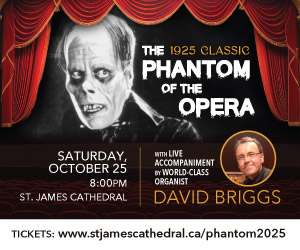What do a Medieval mystic, Santa Claus and Elvis Presley have in common? They are the centerpieces of contrasting concerts in Southern Ontario this July and August. Stylistic extremes are quite common in any healthy choral scene, but in the summer, when many choirs are on hiatus, the relative paucity of concerts makes the contrasts even more noticeable.
 The Elora Festival (July 9-August 1) has as its centerpiece the excellent Elora Festival Singers, who are performing a range of music from works by Beethoven, Vivaldi and Handel to a Broadway concert with the great Jackie Richardson as soloist. But if I had to pick one concert to go to during the festival, I would opt for their performance of Benjamin Britten’s oratorio St. Nicholas, on July 25.
The Elora Festival (July 9-August 1) has as its centerpiece the excellent Elora Festival Singers, who are performing a range of music from works by Beethoven, Vivaldi and Handel to a Broadway concert with the great Jackie Richardson as soloist. But if I had to pick one concert to go to during the festival, I would opt for their performance of Benjamin Britten’s oratorio St. Nicholas, on July 25.
Britten is hardly a neglected composer, but I have always been curious as to why his St. Nicholas isn’t performed more often. Written in 1948, it shows all the poise and dash of the young composer of Peter Grimes, combined with the genuine friendliness towards the audience – not an especially widespread attitude in 20th-century composers – of The Young Person’s Guide to the Orchestra. The subject of the work is of course the Medieval bishop who was the source for the modern Santa Claus, and with Christmas concert attendance often being the economic anchor for many choral groups, I would have thought that this clearly seasonal work could do well against more familiar seasonal offerings by Handel, Bach, Monteverdi and others.
One possible explanation for St. Nicholas’s relative rarity in concert is its unusual scoring. Written in celebration of the centenary of the English boy’s school Lancing College, Britten made use of the school’s comprehensive musical resources to score the piece for tenor soloist, an adult mixed choir, a children’s choir, two pianos, organ, percussion and strings. To quote a character in Robertson Davies’s A Mixture of Frailties, it is “just the size to be neglected.” He might have been referring to St. Nicholas.
Britten’s conception of St. Nicholas himself is filled with nuance. Outwardly powerful, stern yet benign, the true character of the bishop is one of doubt and conflict. This powerful tenor role alternates between quiet soliloquies and fiery sermons, while the choral movements encompass childlike playfulness, pageantry, savage cannibalism, a wonderful depiction of a storm at sea and finally Nicholas’s death and ascent into sainthood. It is a rare treat to hear this work in concert, especially this time of year.
The Medieval mystic mentioned above is Hildegard of Bingen, and her music is the focus of a concert on August 8 given by Schola Magdalena, a five-voice ensemble of female singers based out of Toronto’s Church of St. Mary Magdalene. Hildegard was a medieval polymath of almost Leonardian scope, and recent researches into both early music and the work of female composers has brought her work, neglected for centuries, into new focus.
Medieval scholars often struggle with lost or incomplete sources in their attempts to shine a light on the past. They have been lucky with Hildegard, who left behind a clear legacy of songs, poems, books and letters that gives us insight both into the times in which she lived and the mind of an individual artist. Performers of her music have found a richness of invention, in which melody can be made to illuminate and enhance the meaning of the text in a way that can be challenging with even the most beautiful chant.
From a Medieval cleric to a modern composer’s take on a Medieval saint, to the proverbial King of Rock and Roll may seem like a unlikely leap – especially in a choral context. But Elvis Presley was a deeply religious man, who loved singing gospel music as a vocal warm-up prior to giving concerts, and whose earliest musical influences were the choirs and quartets that he heard attending church as a young child. On August 20 Hamilton’s Brott Festival Choir and National Academy Orchestra will perform Beethoven’s Ninth Symphony, in good classical fashion. But on August 4 the orchestra is joined by a Gospel choir to perform Elvis: The Way it Was with vocalist Stephen Kabakos. Though the concert will likely focus on Presley’s pop songs, anyone familiar with Presley’s gospel singing can hear clearly the degree to which a song like “Suspicious Minds” draws on that influence.
Performing popular music in a choral context is much trickier than it might seem. Ease with syncopated rhythms is an essential part of the performance of popular music, and classically trained musicians can struggle to free themselves from the straightjacket of notated music, in which syncopation is often difficult to convey convincingly and idiomatically. An awareness of the backbeat (accents on two and four in a 4/4 measure) needs to inform the performance at all times, and often singers must re-jig their vocal style as well. A legato vocal line that serves Handel and Mozart is usually too heavy and rhythmically undifferentiated for popular music.
I predict that even choirs mostly accustomed to classical repertoire will begin to delve with increasing frequency into the world of popular music. The challenge for choirs and choral directors will be to recognize that good execution of popular music takes skills that classical training has neglected, and adjust and even re-train accordingly. The term “performance practice” is often applied to early music: equal care and respect is needed in the area of popular and vernacular music as well.
 Some last notes. The Elmer Iseler Singers perform on July 11 at Westben, and at Parry Sound’s Festival of the Sound on July 30 and August 8. The 2010 Ontario Youth Choir, directed this year by Iwan Edwards appear from 27-29 August, in London, Orillia and Toronto respectively. And in a final Gospel context, at Toronto’s Fringe Theatre Festival (June 30-July 11), the play “Maurice Carter’s Innocence” will feature a Gospel choir onstage, helping to illuminate and tell the true story of a miscarriage of justice that led to one man’s wrongful imprisonment, and of the determination of those who fought for his release.
Some last notes. The Elmer Iseler Singers perform on July 11 at Westben, and at Parry Sound’s Festival of the Sound on July 30 and August 8. The 2010 Ontario Youth Choir, directed this year by Iwan Edwards appear from 27-29 August, in London, Orillia and Toronto respectively. And in a final Gospel context, at Toronto’s Fringe Theatre Festival (June 30-July 11), the play “Maurice Carter’s Innocence” will feature a Gospel choir onstage, helping to illuminate and tell the true story of a miscarriage of justice that led to one man’s wrongful imprisonment, and of the determination of those who fought for his release.
Benjamin Stein is a tenor and theorbist. He can be contacted at: choralscene@thewholenote.com.



